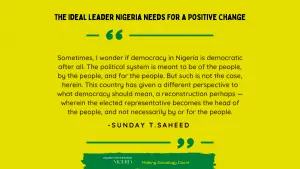In every Nigerian family gathering these days, there’s a growing trend that’s hard to ignore. Someone is usually preparing for “japa”. Japa is now the popular slang for leaving Nigeria for greener pastures.
Among the many professionals leading this wave of migration, our doctors and medical professionals top the chart. The stethoscope, which has always been a symbol of selfless service within our overstretched health sector, has now become a boarding pass to foreign hospitals.
This mass exodus, while understandable on an individual level, is costing the country more than we can currently measure financially, socially, emotionally, and morally.
This essay seeks to explore the sociological and economic impact of the mass departure of Nigeria’s medical professionals, compare the cost of medical education at home and abroad, highlight existing policies, give voice to affected families, and propose clear steps for Nigeria to retain her brightest minds.
Exodus of Healers: The Data Speaks
Nigeria’s medical brain drain isn’t a new phenomenon, but it has assumed alarming proportions in the last decade. According to the Nigerian Medical Association (NMA), in the past five years alone, over 15,000 Nigerian doctors are currently practicing abroad, with an average of 2,000 leaving annually as of 2023. The United Kingdom alone hosts over 11,000 Nigerian-trained doctors, making Nigeria the third highest contributor of foreign doctors to the UK National Health Service (NHS), after India and Pakistan.
The United States, Canada, Australia, Saudi Arabia, and even small Caribbean nations have become preferred destinations for Nigerian doctors.
The reasons for Nigerian doctors leaving are clear: better working conditions, higher pay, improved equipment, security, respect for the profession, and well-structured health systems.
For instance, while the average monthly salary of a Nigerian doctor ranging between ₦200,000 and ₦500,000 (roughly $130 to $330), a junior doctor in the UK earns around £2,500 monthly (₦4 million equivalent), and in Saudi Arabia, the figures are as high as $7,000 per month (₦10 million equivalent)
The process of leaving Nigeria for doctors is stressful, but it has now become systematized. Many doctors write the PLAB (UK), USMLE (USA), or MCCQE (Canada) exams while still in medical school. Online forums, migration agencies, and WhatsApp groups now serve as the new guidance counselors for the japa generation.

The Price of Knowledge: Comparing Education Costs
Studying medicine in Nigeria is still relatively affordable compared to most Western countries, largely due to government subsidies. In federal universities, students pay as low as ₦100,000 to ₦300,000 per session (under $200). These fees are even as a result of the recent hike in tuition fees. It used to cost a lot cheaper.
This cost is significantly subsidized, as it is estimated that training one medical doctor in Nigeria costs the government between ₦5 million to ₦8 million, depending on the institution and state.
In contrast, studying medicine abroad costs significantly more. In the UK, international students pay an average of £35,000 annually for medical school. That’s about ₦60 million per year. In the U.S., the cost is even higher. It costs up to $60,000 per year, totaling nearly ₦100 million annually. That’s roughly half a billion Naira for the five years of study. There is hardly any Nigerian middle class family that can afford this.
Here lies the paradox: while the Nigerian government spends millions training doctors at home, other countries reap the benefits with little to no investment. This economic model where Nigeria bears the cost while the West enjoys the yield is unsustainable.
A Subsidy Gone to Waste?
If we were to do a simple cost-benefit analysis, the numbers are heartbreaking. With thousands of doctors emigrating annually, and assuming an average training cost of ₦6 million per doctor, Nigeria is losing over ₦12 billion yearly in subsidized investments. And that’s just direct costs. This sum doesn’t factor in the years of human labor, the potential lives saved, or the long-term impact on our healthcare system.
According to the World Health Organization (WHO), Nigeria’s doctor-patient ratio is about 1:5,000, which is far below the recommended 1:600. Each doctor that leaves Nigeria widens this gap, and worsens the health outcomes for millions of Nigerians.
Government hospitals are perpetually short-staffed, especially in rural areas. Specialists are becoming scarce. Young, aspiring doctors are uninspired, and the cycle of decline continues.
What Has the Government Done?
To be fair, the Nigerian government has acknowledged the problem. In 2023, the House of Representatives proposed a controversial bill requiring newly graduated doctors to work for five years in Nigeria before receiving full licenses to practice or emigrate.
While the intent of the Bill was patriotic, the proposal was widely criticized as draconian and short-sighted. Many critics pointed out that you can’t legislate loyalty. It is believed that loyalty must be earned through good governance, decent working conditions, and fair pay.
Apart from that, little has been done in policy terms. No comprehensive retention package exists. No nationwide incentive scheme for rural postings. No diaspora reintegration strategy for returning professionals. Even the Basic Healthcare Provision Fund, meant to improve health facilities at the grassroots, is underfunded and poorly managed.
The Human Angle: Broken Homes, Lonely Parents
Beyond economics and policy, the social consequences of brain drain run deep. In Kaduna, I met a retired teacher who proudly showed me pictures of her three children who are all doctors, now working in Canada and Saudi Arabia. Her eyes lit up with pride, but moments later, she sighed. “They send money, yes. But money is not the same as their physical presence or that of their children,” she said. “I only see them on screens.”
Many Nigerian families are now raising grandchildren alone, with their children scattered across time zones. Community support systems are weakening. Celebrations feel hollow. Funerals are attended via Zoom. The village squares are no longer vibrant, because our youths are healing other nations.
Moreover, young Nigerians, seeing the success of their siblings abroad, are increasingly disillusioned with Nigeria. The spirit of service is vanishing. The belief in national rebirth is being replaced with exit plans. This silent migration is as much about hope as it is about health.
Who Wins? Who Loses?
In the short term, Nigerian doctors benefit financially from emigration. Their families enjoy remittances, and their skills are finally rewarded. But at a societal level, Nigeria is hemorrhaging. Our health system is collapsing under the weight of unmet needs. Those who cannot afford private hospitals or international travel are condemned to poor care or none at all.
Very recently a professor in a Nigerian university was forced to solicit funds from the public to cater for his medical bills abroad. The sum was ₦12 million but he couldn’t raise it because the Nigerian system has failed him. ₦12 million is the monthly salary of a Nigerian doctor working in Saudi Arabia. Yet, a Nigerian professor could not raise it to cater his medical bills abroad.
Another problem for the diaspora doctors, though successful, often comes in the form of their battle with cultural alienation, racism, and a gnawing sense of loss. Many would prefer to serve at home, if only Nigeria made it easier.
The Nigerian government loses revenue, reputation, and its most precious human capital. Our development goals, such as the Sustainable Development Goals (SDGs), become harder to achieve without a strong, stable health workforce.
A Roadmap for Change
Solving medical brain drain requires more than emotional appeals or patriotic slogans. It requires smart, actionable, people-focused solutions. Here are some recommendations:
1. Improve Doctor Welfare: This starts with salary increases, housing schemes, hazard allowances, and insurance packages.
2. Create a Medical Diaspora Policy: Encourage doctors abroad to contribute through missions and knowledge-sharing.
3. Decentralize and Equip Teaching Hospitals: State governments must invest in facilities and research labs. These will enable more avenue for training local doctors by states to become specialists and serve the population better.
4. Establish Return Incentive Programs: Incentivize returnees with tax holidays and private practice grants.
5. Engage in Bilateral Agreements: The Nigerian government should push for compensation or grants from countries benefiting from our doctors.
6. Listen to the Professionals: Doctors and their associations must be part of policymaking.
Conclusion
Nigeria’s medical brain drain is not just a professional migration. It is a loud cry from a wounded nation. It speaks of broken promises, underinvestment, and the flight of hope. But like any critically ill patient, the right intervention can lead to recovery.
We cannot stop our doctors from dreaming. But we can make Nigeria a place where dreams are possible. Not just abroad, but right here at home. A healthy Nigeria needs healthy doctors, and a healthy doctor needs a system that works. We must build that system now, not later.
Because if we don’t, someday soon, we may wake up to find that we have exported all our healers… and there’s no one left to save us.







